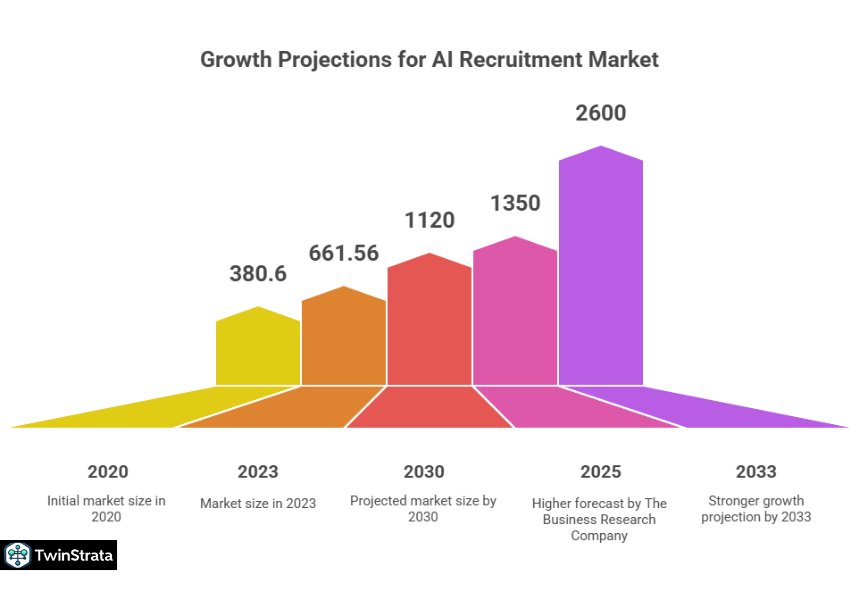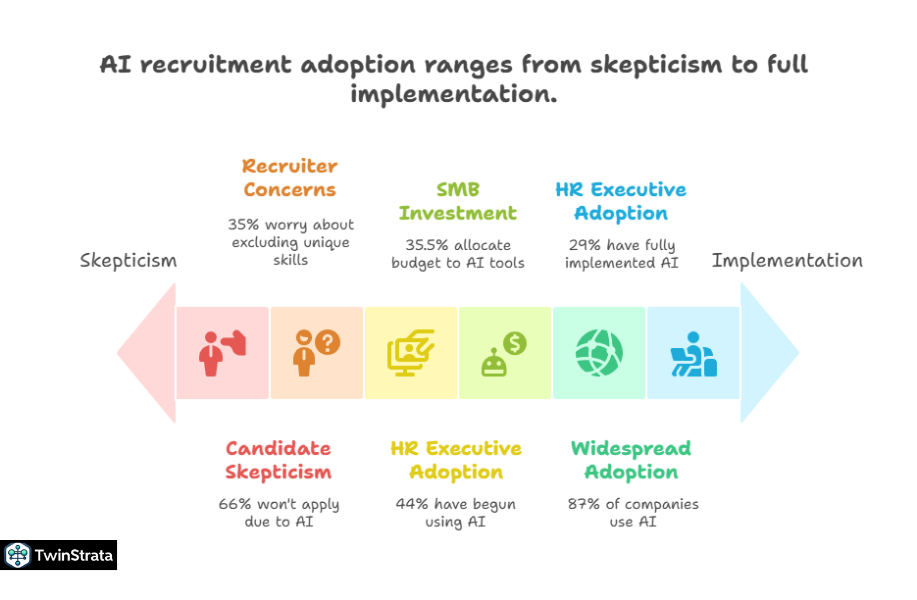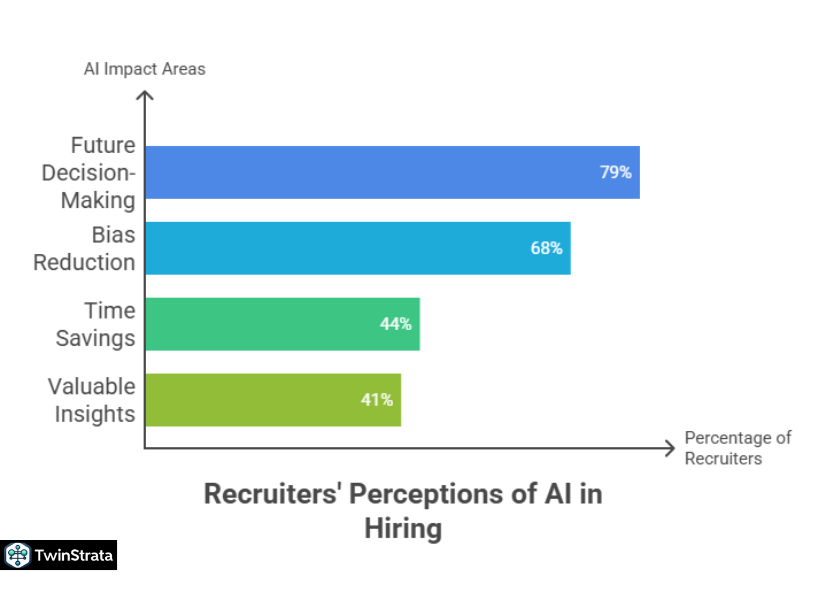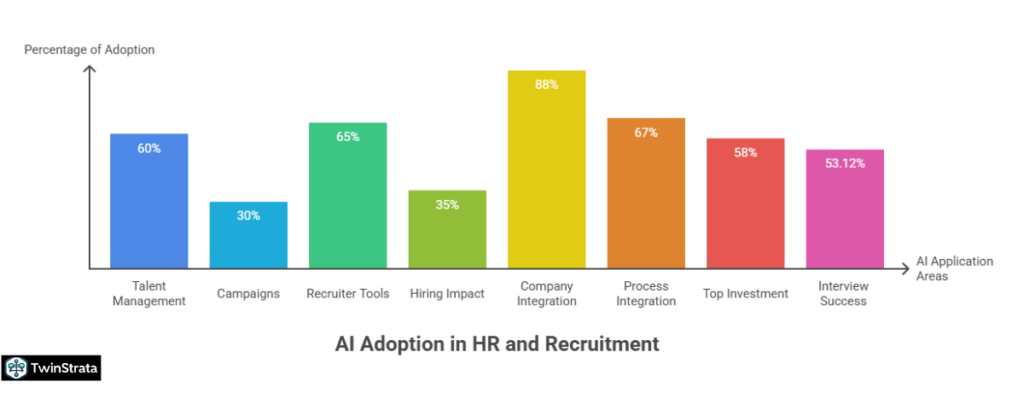Companies around the world actively integrate AI into their hiring processes in 2025. AI recruitment transforms how businesses find and select talent.
The global AI recruitment market reaches $661.56 million in 2023 and projects to hit $1.12 billion by 2030 with a CAGR of 6.78%. Recruiters save time, cut costs, and improve candidate matches through AI tools.
However, challenges like bias concerns and candidate skepticism persist. This article explores key AI recruitment statistics 2025, blending data from various sources.
It helps readers understand AI recruitment and use it to their advantage, whether as job seekers or employers. We draw from recent discussions on platforms like Quora and Reddit, where users share real-world experiences and questions about AI’s impact on jobs.
Table of Contents
ToggleThe Growing Market Size of AI Recruitment in 2026

AI recruitment expands rapidly in 2025. The market grows from $380.6 million in 2020 to $661.56 million in 2023. Experts predict it will reach $1.12 billion by 2030.
This growth reflects a CAGR of 6.78% from 2023 to 2030. Some sources, like The Business Research Company, forecast even higher figures, estimating the market hits $1.35 billion in 2025 alone, driven by faster adoption.
Another projection shows the global AI in recruitment market climbing to $2.6 billion by 2033 from $0.8 billion in 2023, with a stronger CAGR of 12.4%.
North America leads the charge. In 2022, AI cuts HR costs by 40% in this region, generating $206.4 million in revenue. Projections show North America contributes $323.2 million by 2030.
Europe follows closely with a 36% cost reduction in 2022. Asia-Pacific sees 25% savings, while the rest of the world achieves 20%. These regional differences highlight how AI adapts to local needs.
| Year | Market Size of AI Recruitment Industry |
| 2020 | $380.6 million |
| 2021 | $470.3 million |
| 2022 | $540.4 million |
| 2023 | $661.56 million |
| 2030 | $1.12 billion |
The enterprise sector drives much of this growth. It expands at a CAGR of 6.78% and reaches $275.2 million by 2030. The IT and telecommunications sectors hit $132.9 million, while education reached $130 million.
Companies invest heavily because AI reduces hiring costs by up to 30% per hire and boosts revenue per employee by 4%. On Quora, users often ask about market trends, with one popular thread noting that generative AI could replace 300 million full-time jobs by 2030, sparking debates on reskilling.
- Also read about: AI Market Size Statistics
Adoption and Usage of AI in Recruitment Processes

Businesses widely adopt AI for recruitment in 2025. Around 87% of companies use AI-driven tools, up from previous years. Fortune 500 companies lead with 99% implementation.
More than 65% of recruiters already use AI to hire, and 67% of organizations incorporate it into their processes. A 2025 survey from Insight Global reveals 99% of hiring managers use AI, with 98% reporting efficiency gains.
Recruiters integrate AI across industries like marketing, healthcare, education, and retail. About 73% of companies plan to invest in recruitment automation, with AI investments surging 54% from 2022 to reach $142.3 billion.
Software dominates the AI recruitment market with over 68.9% share in 2023, while cloud-based solutions hold 70.5%. Candidate sourcing and screening top applications at 30.1%, and IT/telecom leads verticals at 23.4%.

Small and medium businesses allocate 35.5% of their budgets to AI recruiting tools. Mid-market companies follow with 24%.
On Reddit, users in r/Futurology discuss how AI replaces thousands of jobs monthly—over 27,000 cuts linked to AI since 2023. One thread highlights tech hiring dropping 58% in early 2025, urging job seekers to learn AI skills for advantage.
| Region | Cost Cutting from AI in HR |
| North America | 40% |
| Europe | 36% |
| Asia-Pacific | 25% |
| Rest of the World | 20% |
Source: Market Research Future.
HR executives actively use AI. 44% implement it for recruiting and hiring, 44% for payroll and benefits. Only 27% avoid AI in recruitment entirely.
Leading tech companies plan 60% investment in AI-powered software. Discussions on Quora emphasize AI’s role in hybrid work models, a top HR trend for 2025.
Key Benefits of Using AI in Recruitment

- Future Decision-Making: 79% of recruiters believe AI will soon be advanced enough to make hiring and firing decisions.
- Bias Reduction: 68% of recruiters state AI can help remove biases from hiring processes, a significant advantage given that 48% of hiring managers admit to having some form of bias.
- Time Savings: 44% of recruiters highlight saving time as a primary reason for implementing AI.
- Valuable Insights: 41% of recruiters find that AI offers valuable insights, simplifying their jobs (39%).
Source: Statista.
Challenges and Concerns in AI Recruitment
Despite benefits, challenges arise. 35% of recruiters worry AI excludes unique candidates. 26% fear it destroys HR jobs. 21% see overlooking atypical qualities as the main danger, followed by algorithmic bias at 18%. Candidates manipulate tech at 16%, and 14% drop out due to discomfort.
In the U.S., 66% of adults avoid AI-involved jobs. 71% oppose AI for final decisions. 37% view racial bias as a major issue, with 13% believing AI worsens it—20% among Black Americans. Pew Research notes 15% think AI can’t treat applications equally, 23% say it misses qualified applicants, and 44% believe it overlooks potential.
| Ethnicity | Share Believing AI Worsens Racial Bias |
| Black | 20% |
| Asian | 12% |
| Hispanic | 13% |
| White | 12% |
| Overall | 13% |
Candidates demand transparency. 79% want notification of AI use, and 75% accept it with clear explanations. 53% prefer human final reviews for soft skills. Privacy concerns grow—50% worry about data handling, 44% oppose monitoring in interviews.
On Quora, users question AI-generated resumes’ trust, noting AI improves screening but needs human oversight. Reddit’s r/technology highlights AI screening before humans, raising bias fears from training data.
Only 31% of recruiters let AI decide hires fully; 75% want human involvement. 56% of job seekers oppose AI for hiring/firing without humans. These concerns show AI needs balance with ethics.
Current State of AI Recruitment in 2026

AI usage surges 68.1% from 2023 to 2024, continuing into 2025. 60% of organizations use AI for talent management. 30% apply it to campaigns, 65% of recruiters use tools, and 35% say it affects hiring most. Over 100 startups develop AI for HR.
88% of companies integrate AI in HR, with North America at 37.5% market share and $0.3 billion revenue in 2023. 67% use AI in processes, 58% see it as top investment. A 2025 Insight Global report shows 93% value human involvement, 54% care about applicant AI use.
Reddit users in r/sysadmin discuss AI superseding generalist roles, predicting tougher markets. Quora’s HR trends for 2025 include AI analytics for retention, employee well-being focus. AI-led interviews yield 53.12% success in human rounds, per World Economic Forum.
Future Outlook for AI Recruitment
AI shapes recruitment’s future. 79% of recruiters think AI handles hiring/firing soon. 63% say it replaces screening, 56% platform searching, 46% job descriptions, 37% initial interviews. 31% believe AI takes over entirely, but 15% say it never replaces humans.
By 2026, 62% of employers expect AI for most hiring steps; 74% plan increased use. 85% of HR pros see AI replacing aspects. Human judgment remains key for 47%. LinkedIn data shows AI messaging boosts outcomes by 9%.
On Quora, users predict AI replaces 300 million jobs by 2030, advising skill-building in AI ethics. Reddit’s r/cscareerquestions forecasts marginal job market improvement in 2025, with entry-level scarcity. AI pauses hiring in some sectors, like software engineering at Salesforce.
The market grows to $1.35 billion in 2025. 34% of employees expect generative AI for over 30% tasks. The future blends AI efficiency with human insight for fair hiring.
How Readers Can Use AI Recruitment for Their Benefit
Readers benefit from AI recruitment by embracing it strategically. Job seekers use AI tools to optimize resumes, matching keywords from job descriptions. This increases ATS pass rates. Platforms like LinkedIn’s AI-assisted messaging help craft personalized applications.
Employers implement AI for faster sourcing, reducing time-to-hire by 50%. Start with free tools for screening, then scale to paid platforms. Train teams on AI ethics to avoid bias. On Reddit, users in r/developersIndia share tips: Learn AI skills for 2025 batches, as companies hire those adapting to tech.
Quora discussions suggest trusting AI resumes if verified in interviews. Job seekers prepare for AI interviews by practicing with bots, focusing on authentic responses. Employers foster transparency, notifying candidates of AI use to build trust. Overall, view AI as a partner—job seekers gain visibility, employers find better fits. Invest in upskilling; 36% of recruiters report improved performance from AI hires.
General AI Recruitment Statistics 2026
AI reduces turnover by 35% and cost-per-screening by 75%. 94% confirm streamlined processes. 79% see AI for full decisions. Dangers include bias (18%) and overlooked aspects (16%).
HR AI usage varies: Employee records (37% fully implemented), performance (34%), onboarding (27%). Tech investments: Sourcing tools (91%), branding (86%), headcount (81%).
From recent web data, only 1 in 5 large companies fully implement AI, but 74% plan increases. 41% of top employers actively use it. On Quora, 71% of employers struggle finding skills without AI.
FAQs About AI Recruitment Statistics
1. What is the projected market size for AI recruitment in 2025?
The AI recruitment market is projected to reach around $1.35 billion in 2025, according to some industry reports, reflecting rapid growth driven by increased adoption across sectors.
2. How does AI help reduce bias in hiring?
AI helps reduce bias in hiring by analyzing data objectively, focusing on skills and qualifications rather than personal characteristics, which 43% of hiring decision-makers cite as a key benefit.
3. Why do some candidates avoid jobs using AI in recruitment?
Some candidates avoid jobs using AI in recruitment because they worry about lack of personal touch, potential biases in algorithms, and privacy issues with data handling, as noted by 66% of U.S. adults.
4. Can job seekers use AI to improve their applications?
Job seekers can use AI to improve their applications by leveraging tools that optimize resumes for keywords, suggest personalized cover letters, and simulate interviews, increasing their chances of passing initial screens.
5. What is the future role of humans in AI-driven recruitment?
The future role of humans in AI-driven recruitment involves providing oversight for final decisions, assessing soft skills like cultural fit, and ensuring ethical practices, as 93% of hiring managers value human involvement.
Also Read:
- Google Search Statistics
- Internet Usage Statistics
- Google Chrome Statistics
- Grok AI Statistics
- Perplexity AI Statistics
Conclusion
AI recruitment defines hiring in 2025. Over 87% of companies use it, saving time (67%) and reducing bias (43%). The market grows to $1.12 billion by 2030, with benefits like 30% cost cuts.
Yet, 66% of U.S. adults hesitate on AI roles, and 35% of recruiters fear missed talent. Balance automation with human touch for success. Readers adapt by learning AI tools, ensuring ethical use.
Discussions on Quora and Reddit show real concerns like job loss, but also opportunities in reskilling. AI transforms recruitment—embrace it wisely.
